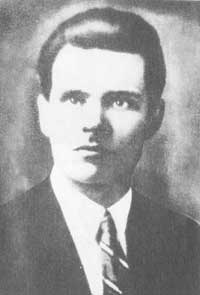Nestor Makhno
|
|
Nestor Ivanovich Makhno (October 27, 1889–July 25, 1934) was an anarchist Ukrainian revolutionary who refused to align with the Bolsheviks after the October Revolution.
He was born into a poor peasant family in Hulyai Pole, Ukraine and participated in the Russian Revolution of 1905, after which he became an anarchist. As a result of his activism against the Tsar, in 1910 he was sent to prison. After the February Revolution in Russia, political prisoners were granted amnesty and Makhno was released. He joined the revolutionary movement in Ukraine and helped organize expropriation of property formerly owned by landlords and capitalists.
In early 1918 the new Bolshevik government in Russia signed the Treaty of Brest-Litovsk making peace with the Central Powers, but ceding large amounts of territory to them including Ukraine. The people living in Ukraine did not want to be ruled by the Central Powers, and so rebelled. Partisan units were formed that waged guerilla war against the Germans and Austrians. This rebellion turned into an anarchist revolution. Nestor Makhno was one of the main organizers of these partisan groups, who united into the Revolutionary Insurrectionary Army of Ukraine (RIAU), also called the Black Army (because they fought under the Black Flag, black being the color of anarchism), Makhnovists or Makhnovshchina (i.e., Makhnovism). The RIAU also battled against the Whites (counter-revolutionaries) and anti-semitic pogromists. In areas where the RIAU drove out opposing armies, villagers (and workers) sought to abolish capitalism and the state through organizing themselves into village assemblies, communes and free soviets. The land and factories were expropriated and self-management implemented.
The RIAU succeeded in defeating the Germans, Austrians, Ukrainian Nationalists and multiple regiments of the White Army. During the civil war they had made an alliance with the Bolsheviks against their common enemies and succeeded in a common victory. However, at the end of the war, the alliance was dissolved and the Bolsheviks, under the command of Mikhail Frunze, invaded Ukraine and eventually succeeded in conquering it. Makhno fled into exile, where he would remain for the rest of his life.
In 1926, Makhno, joining other Russian exiles in Paris as part of the group "Delo Truda" (Дело Труда, Сause of Labour), co-wrote and co-published the Organizational Platform of the Libertarian Communists, which put forward ideas on how anarchists should organize based on the experiences of revolutionary Ukraine and the defeat at the hand of the Bolsheviks. The document was initially rejected by most anarchists, but today has a wide following. It remains controversial to this day, continuing to inspire some anarchists because of the clarity and functionality of the structures it proposes, while drawing criticism from others (including, at the time of publication, Voline and Malatesta) who view its implications as too rigid and hierarchical.
Makhno was cremated three days after his death, five hundred people attending his funeral.
External links
- Nestor Makhno Archive (http://www.nestormakhno.info/)
- The Makhno FAQ (http://www.infoshop.org/faq/secH6.html)
- Text of the "Platform" (http://struggle.ws/platform/plat_preface.html)
Further reading
- Makhno, Nestor. The Struggle Against the State & Other Essays AK Press
- Skirda, Alexandre. Nestor Makhno - Anarchy's Cossack : The Struggle for Free Soviets in the Ukraine 1917-1921 AK Pressde:Nestor Machno
es:Nestor Makhno it:Nestor Makhno fi:Nestor Mahno fr:Nestor Makhno he:נסטור מכנו pl:Nestor Machno ru:Махно, Нестор Иванович

